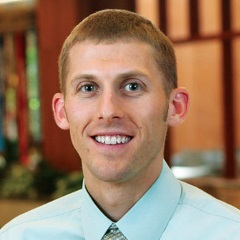Muscle Cramps Are Body’s Signal That Something is Missing
Fatigue, dehydration and loss of minerals may be the root cause
 FRANKLIN, Ohio (May 10, 2017) – That sudden, sharp muscle spasm that has the power to wake you up in the middle of the night may be a sign that your body is lacking something.
FRANKLIN, Ohio (May 10, 2017) – That sudden, sharp muscle spasm that has the power to wake you up in the middle of the night may be a sign that your body is lacking something.
Muscle cramps can happen at any time of day and in nearly every area of the body, but perhaps the most commonly experienced muscle cramp is a charley horse. A charley horse is an involuntary contraction of a muscle that a person can experience in their arm or leg. According to one local physician, it is usually the body’s sign that it’s running low on sleep, water or key minerals.
“From personal experience, I can attest to the fact that a charley horse is a severe cramping that just doesn’t let up,” said Joshua Ordway, MD, a family physician with Franklin Family Practice. “You want the pain to release quickly, but it often lasts for seconds – which can feel like an eternity – and feels like a hard ball.”
Anyone is susceptible to getting a muscle spasm, said Dr. Ordway, who practices with Premier Physician Network.
“People of all ages can experience muscle spasms,” he said. “A little kid who is playing pee-wee football and becomes dehydrated can experience it. And, by the same token, an adult who overdoes it one day with physical activity, may cause muscle fatigue, and have a muscle spasm.”
For the most part, muscle spasms are harmless and can be resolved with simple remedies that can be done at home. Dr. Ordway recommends the following steps to help treat or reduce the risk of getting a muscle spasm:
- Stretch it out – Stretch before any exercise, and if spasms do occur during your workout stop immediately and gently massage and stretch the affected area. Resume your workout as soon as the pain subsides. You can also stretch your muscles in the evening if you exercised that day and have concern that a spasm may happen overnight.
- Apply heat and ice – Apply a warm compress to the muscle when the spasm first occurs and apply ice after it passes. Anti-inflammatory medications such as ibuprofen may also help.
- Drink plenty of water – Dehydration can trigger muscle spasms. Make sure you are drinking plenty of water each day, and increase that if exercise is part of your routine, especially prior to and during exercise. A good way to determine if you are taking in enough water during exercise is whether you have the urge to urinate once you are finished. If not, increase your intake.
- Check your medication – A muscle spasm can be a sign that the body is experiencing a depletion in magnesium or potassium. Certain medications can often cause this. Check with your health care provider if you are taking maintenance medication and experiencing muscle spasms. If necessary, tests can be performed to determine the level of these minerals in your body.
- Increase your fruits and veggies – A muscle spasm can be a sign that you’re not getting the nutrients your body needs to properly function. Dr. Ordway said increasing the amount of fruits and vegetables consumed in a day can also help.
- Seek professional advice – There are times when a muscle spasm should be evaluated by a medical professional. According to the National Institutes of Health (NIH), seek advice if your muscle spasm is accompanied by severe pain, weakness, or if it doesn’t stop and spreads to other parts of the body.
For more information on muscle spasms or to find a Premier Physician Network physician near you, visit here.
Contact Us
Discover more about Premier Health and join us in building healthier communities in Southwest Ohio. Learn more about working at Premier Health, becoming a volunteer, and making a gift to support our mission.

